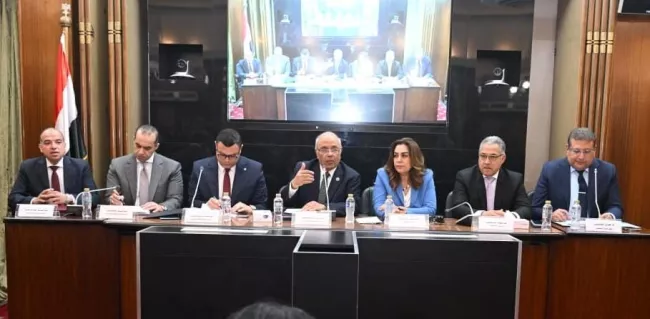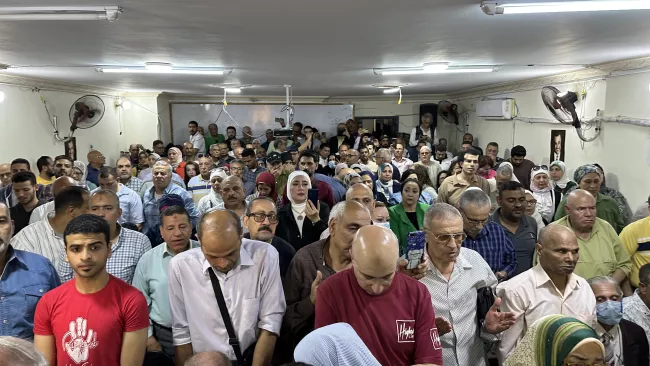
Parliament Diaries| Everyone loses as rent law passes unchanged
The joint parliamentary committee tasked with reviewing amendments to the Old Rent Law passed the government’s revised draft unchanged. But the session that sealed the decision—held on a tense Tuesday afternoon—was anything but smooth.
Disagreements erupted over several articles, and it took Minister of Parliamentary Affairs Mahmoud Fawzy’s intervention to cool tempers. The flashpoint: how committee chair MP Mohamed Attia El-Fayoumi managed the room.
Ever since the government introduced its first version of the bill in April, it was clear it wouldn’t pass as is. We had predicted it then—and sure enough, extending the transitional period beyond five years became inevitable. That’s now reflected in the draft.
The change followed six dialogue sessions, where landlords, tenants, and syndicate reps voiced their discontent—each side for its own reasons.
No one’s satisfied
It didn’t take long. Minutes after Parliament published the amended bill, rejections flared online—from both landlords and tenants. Landlords fumed over the seven-year transitional period, insisting five was already too generous; they had asked for three. Tenants, meanwhile, saw that even seven years remain a betrayal of their right to secure housing.
Besides tweaking the timeline, the new version revised the mechanism for rent increases—tying them to social and geographic factors determined by governorate-level committees. A new clause was also added: if a tenant leaves a unit unoccupied for over a year without good reason, it must be returned to the owner.
Minister Fawzy acknowledged the balancing act, saying, “No one walks away from this law entirely winning—or entirely losing.” Even the government, he admitted, is paying a price. He pointed to Article 8, which offers some cover for displaced tenants.
That article gives tenants the right to apply for alternative state-provided housing—either rental or ownership. Priority goes to vulnerable groups: original tenants, their spouses, and parents. But to qualify, applicants must commit in writing to vacating their current unit as soon as the new one is allocated.
This revision came after objections from various parties, including the parliamentary majority, who saw the original article as too vague in promising “priority access.”
The state bears blame
For the first time, Mohamed Abdel-Alim Kafafi —the legal advisor to the Speaker—joined the legislative fray. He’s usually reserved for Parliament’s most polarizing bills, such as medical liability or criminal justice reform.
Kafafi responded to arguments raised during the hearings, particularly that Parliament has no constitutional grounds to alter old rent arrangements. He pushed back, referencing Constitutional Court rulings—especially one from 2002 that limited lease inheritance to one generation.
He reminded MPs that the extraordinary housing crisis had once justified exceptional legislation. “Yes, the state once restricted property rights to protect society,” he said, citing the 2002 Constitutional Court ruling that warned against policies threatening the cohesion of Egyptian society.
Kafafi stressed that Parliament’s legislative authority was not only intact, but constitutionally grounded—especially when the judiciary itself had already intervened. “If the Constitutional Court amended the law once, surely Parliament can too.”
In his view, the Constitution is not being circumvented but upheld, as long as Parliament acts to restore balance. He traced the root of the crisis back to the state itself “By entering the tenant–landlord relationship, the state created this problem. It must now help solve it.”
A vote without debate
After speeches by Kafafi and Fawzy, Chair El-Fayoumi moved quickly to a vote—skipping an initial discussion of the bill’s general framework. MP Diaa El-Din Dawood and others pushed back. Though not committee members, they had a right to speak.
“You’ve spoken already,” El-Fayoumi told Dawood. “Let’s move to the articles.” Dawood insisted: this version was different from the one they’d previously debated. Eventually, El-Fayoumi relented. “You know I hold you in high regards.”
Still, friction lingered. El-Fayoumi asked Dawood to take the podium. Dawood wanted to speak from his seat. They debated protocol before Dawood complied.
Is the state capable—or incapable?
From the podium, Dawood delivered a stark warning. The same conditions that once justified old rent laws, he said, still apply today. Wars abroad. A crisis at home. An economy stretched thin.
“This isn’t about winning or losing. It’s about the nation.” He pointed to the freshly approved national budget—one laden with debt and gaps. By October, he predicted, Parliament would be forced to revise it.
He referenced the 2002 court decision “Sure, they ruled for first-generation inheritance. But back then, a kilo of meat didn’t cost 500 pounds.”
With 55% of Egyptians under the poverty line by World Bank estimates—35% by domestic ones—he asked “Are these people landlords or tenants?”
He questioned the promise of alternative housing. “A 90-meter unit costs nearly a million pounds. How does a retiree living on 6,000 pounds a month afford that?”
Turning to Minister of Local Development Manal Awad, he said plainly, “This state can’t deliver. Not now, not in seven years.”
“We represent both sides, the landlords and the tenants,” Dawood said. “And we swore to protect this country. This bill is a time bomb.”
El-Fayoumi snapped back “You said all this last time.” Dawood responded wryly, “Maybe I’ve got Alzheimer’s. But a lawmaker can repeat himself ten times if he needs to. You’re not our overseer.”
Valid questions, no answers
Justice Party MP Abdelmonem Emam shared Dawood’s concerns. What if a tenant can’t qualify for housing under the government’s criteria?
“Will you rewrite banking rules to help them qualify?” he asked. “You’d be dismantling the very formulas those projects are built on.”
He raised another question: most original tenants are elderly. “Will you give them 20-year mortgages? Or a cash handout?”
Kafafi replied: the plan prioritizes rentals.
Dawood pushed again “What if they’re evicted and have nowhere to go?” Fawzy responded that families wouldn’t be left homeless. Dawood replied, “I’ve got 10,000 vulnerable families in my district. The governorate hasn’t housed a single one in six years.”
Fawzy insisted “This is a special law for a special case.” He claimed the law would help “close the chapter.” Dawood countered “Just don’t close it over people’s heads.”
Fawzy objected to the phrase, framing it as an affront to democratic legitimacy. “This is the people’s government and the people's Parliament,” he said, reaffirming that both the executive and legislative branches are accountable to the public.
Tensions boil over
The committee reached a preliminary approval of the bill, with unanimous agreement among members of the Housing and Constitutional Affairs Committees. Absent from the vote were Local Administration Committee Chair Ahmed El-Sigini and Deputy Chair Mohamed El-Husseini, who had left earlier without stating their positions to attend a separate meeting on the Waste Management Law’s impact assessment.
Then came another clash—this time ignited by El-Fayoumi’s handling of the session.
His approach sparked renewed tension with opposition MPs, and soon even between lawmakers themselves. The dispute escalated until opposition MPs walked out of the room altogether. It took Minister Mahmoud Fawzy leaving the chamber to calm them down and bring them back.
The disagreement began when opposition MPs not formally part of the committee asked for a roll-call vote on the draft’s general approval. MP Sameh El-Sayeh objected, demanding the session be managed from the podium: “We’re not running things from over here.” MP Ahmed El-Sharkawy countered, “We’re following the rulebook, sir.” Then MP Ahmed Farghaly jumped in, addressing El-Sayeh: “Are you the committee’s lawyer now?”
As tensions climbed, El-Fayoumi declared, “I’m the one running this session,” prompting the opposition to threaten issuing a public statement.
When order was restored a few minutes later, El-Fayoumi called for a show-of-hands vote. “Unanimous among those present. Majority of the committee,” he announced.
MP Diaa El-Din Dawood shot back, “I swear to God, this law is going to ignite the country.” El-Fayoumi dismissed the remark: “That kind of talk isn’t helpful. This is how democracy works.” Dawood retorted, “Let’s see what democracy delivers for the Egyptian people.”
El-Fayoumi then requested that MPs with proposed amendments submit them in writing. Opposition MPs rejected the move, insisting it wasn’t part of the internal rules. El-Fayoumi appeared to apply general session protocols to committee proceedings—something the bylaws don’t mandate.
MP Abdelmonem Emam urged patience: “There are just two contentious articles. Bear with us.” Still, El-Fayoumi insisted on written proposals. El-Sharkawy pushed back, “What if I don’t have one in writing? Shouldn’t the article still be discussed?” Fawzy intervened: “We ask you to allow any MP with amendments to speak. The government will respond.”
Dawood turned to El-Fayoumi with a pointed question: “After all the progress you made in the public hearings, this is how you run the most important session?” He walked out of the chamber, followed by Emam, El-Sharkawy, and Farghaly. Minister Fawzy once again stepped in—this time outside the chamber—to convince them to return.
The original tenant left behind
MP Ahmed El-Sharkawy raised one final issue: the original tenant’s exclusion.
“Anyone who signed a lease after 1981 knew it was permanent. Rent and deposits were calculated that way. Now we’re undoing that understanding, and this is not fair,” he said.
He proposed a simple fix: exempt original tenants, their spouses, and minor children from the eviction clause in Article 2. The committee said no.
Fawzy argued the law needed to remain uniform. “No exceptions. Article 8 already addresses priority groups—including original tenants.”
MP Ahmed Hamdy Khattab also failed to convince Parliament to extend the transition to ten years, or exempt clinics, medical labs and pharmacies from eviction.
The bill passed as is, with no changes to the government’s original articles. But under El-Fayoumi’s management, the session took on a tense, confrontational air—as if erasing the progress Parliament had made over weeks of rare, inclusive public dialogue. Ironically, it was the government—through Minister Fawzy—that appeared more flexible and willing to listen to the opposition, in contrast to MPs who seemed bent on pushing the bill through at pace, as though under specific instruction to bring it to a swift close.


